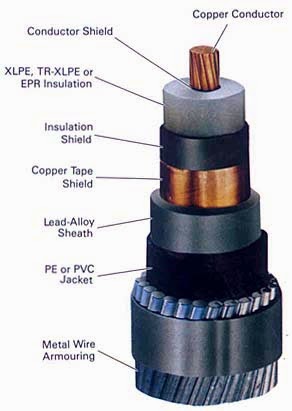Difference between XLPE and PVC Cables
Both Cables are widely used in Industries:
PVC - stands for polyvinyl chloride
XLPE - is cross linked polyethylene cable.
Main Thumb rule for differentiation is that XLPE cables can be used for both HT and LT lines.
But PVC Cables can be used only for LT lines.
XLPE can withstand a higher temperature than PVC without detriment. This means that more current can be conducted for the same cross sectional area of copper. This means a big saving in cables costs.
Visit link below for more details:-
http://electrialstandards.blogspot.com/2014/04/66kv-to-132kv-tests-requirement.html
http://electricalsystembasics.com/2014/04/xlpe-cables-advantages-oil-filled-paper-insulated-cables.html
XLPE Cables useful properties are :-
XLPE Cables construction:-
1.Temperature resistance
2. Stress rupture resistance
3. Environmental stress crack resistance
4. Resistance to U.V light
5. Chemical resistance
6. Oxidation resistance
XLPE Cables can be useful for following applications:-
1) XLPE cables work for the working voltage of 240 V to 500 KV .
2) Conductor Material can be either Copper or Aluminium.
3) XLPE cables can be either Single Core cables or Multi core cables depending upon the number of
cores.
4) They can be Unarmoured or Strip Armoured or Wire Armoured or Tape Armoured type depending upon the presence or absence of Armour .
5) HT / LT Aerial Bunched Cables
Polyvinyl chloride Cables
They are commonly abbreviated as PVC, insulated cables are widely used in various fields.
PVC's Cables are generally have following Properties:-
1. Low cost
2. Chemical resistance
3. High tensile strength
4. Better flexibility
For electric cables the PVC is mixed up with plasticizers.
Low voltage copper conductor PVC cables are extensively used for domestic home appliances wiring, house wiring and internal wiring for lighting circuits in factories, power supply for office
automation, in control.
PVC CABLES
1) Power Cables upto 1.1 KV
2) Multicore Cables upto 61 Cores
3) Sheilded instrumentation Cables
4) FRLS / FR / HR / Fire Survival Cable
PVC - stands for polyvinyl chloride
XLPE - is cross linked polyethylene cable.
Main Thumb rule for differentiation is that XLPE cables can be used for both HT and LT lines.
But PVC Cables can be used only for LT lines.
XLPE can withstand a higher temperature than PVC without detriment. This means that more current can be conducted for the same cross sectional area of copper. This means a big saving in cables costs.
Visit link below for more details:-
http://electrialstandards.blogspot.com/2014/04/66kv-to-132kv-tests-requirement.html
http://electricalsystembasics.com/2014/04/xlpe-cables-advantages-oil-filled-paper-insulated-cables.html
XLPE Cables useful properties are :-
XLPE Cables construction:-
1.Temperature resistance
2. Stress rupture resistance
3. Environmental stress crack resistance
4. Resistance to U.V light
5. Chemical resistance
6. Oxidation resistance
XLPE Cables can be useful for following applications:-
1) XLPE cables work for the working voltage of 240 V to 500 KV .
2) Conductor Material can be either Copper or Aluminium.
3) XLPE cables can be either Single Core cables or Multi core cables depending upon the number of
cores.
4) They can be Unarmoured or Strip Armoured or Wire Armoured or Tape Armoured type depending upon the presence or absence of Armour .
5) HT / LT Aerial Bunched Cables
Polyvinyl chloride Cables
They are commonly abbreviated as PVC, insulated cables are widely used in various fields.
PVC's Cables are generally have following Properties:-
1. Low cost
2. Chemical resistance
3. High tensile strength
4. Better flexibility
For electric cables the PVC is mixed up with plasticizers.
Low voltage copper conductor PVC cables are extensively used for domestic home appliances wiring, house wiring and internal wiring for lighting circuits in factories, power supply for office
automation, in control.
PVC CABLES
1) Power Cables upto 1.1 KV
2) Multicore Cables upto 61 Cores
3) Sheilded instrumentation Cables
4) FRLS / FR / HR / Fire Survival Cable

Comments
Post a Comment